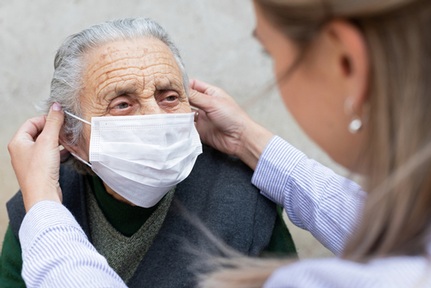Fury as care home residents in Scotland told to wear masks from 25 June
Care home residents in Scotland must wear masks in the communal areas of their care home and while receiving personal care from 25 June.

Residents must wear a mask, unless they are exempt, in all care home communal spaces such as lounges, according to new guidance from the Scottish Government.
Masks must also be worn by residents if they are receiving personal care in their own bedrooms or toilets.
The guidance states care home residents should be given respite from masks but should be encouraged to put on a new one after a reasonable period of time.
The guidance ‘Coronavirus (COVID-19): Guidance on the extended use of facemasks and faced coverings in hospitals, primary care, wider community care and adult care homes’ was updated on 7 June. Care organisations were notified about the guidance update on 8 June by Scotland's chief nursing officer Professor Amanda Croft.
Care home staff have been told to start talking to residents about mask wearing or with carers if the resident lacks mental capacity.
'Unacceptable' form of 'control and restraint'
The policy change has sparked anger amongst families and care homes.
Care Home Relatives Scotland, which represents residents' families, has called the mask-wearing policy an ‘unacceptable form of control and restraint’ created ‘with no apparent consultation with care home stakeholders’.
‘Covid cases are currently at the lowest ever in care homes and vaccine uptake is high.
‘There can be no justification for enforcing residents to wear masks during personal care and communal activities in a setting which is supposed to be their home’.
It said the guidance ‘contravenes human rights and the Adults with Capacity Act.
Twitter users made their views about the new guidance known, with one calling it "Totally Inhumane & sickening!" "Most will be terrified, unable to breathe & communicate. Would this be ok for your parents @NicoliarSturge1 Does vaccine not work?"
'A care home is not a clinical setting!'
Donald Macaskill, chief executive of Scottish Care, which represents care homes, tweeted (@DrDMacaskill) on 9 June: “Similar Guidance in Sept was adjusted to make clear that residents in a care home need to be supported flexibly and that it is their home. We have asked for clarification that this has not changed.
“Residents esp with dementia need to be sensitively supported and wearing a mask continuously is inconceivable. A care home is NOT a clinical setting!”
On 9 June, Scottish Government stated: “Masks are not required in a residents’ own living space or when they are physically distanced from others.
"If a resident is not able to wear a mask they will not be required to wear one – this has always been the case in care home settings.
“A mask should only be used where a resident can tolerate wearing a mask when receiving direct, close personal care where it is not possible to keep a 2 metre distance and will not impact on the provision of care, and when residents in communal areas cannot be physically distant from others.”
“We are working in partnership with the sector and will continue to work with them to alleviate any confusion this guidance may have caused.”
In response, Scottish Care tweeted (@scottishcare) on 10 June: “@scottishcare will continue to work with officials to ensure greater clarity. Residents must be able to live as normal a life as possible without the use of masks in what is their own home unless they choose to wear one.”
Alzheimer Scotland mask wearing exemptions
Alzheimer Scotland has advice about mask wearing and exemption in the dementia charity’s poster which Care Home Relative Scotland argues could apply to most care home residents.
The charity's exemption poster includes:
• People who have a health condition or who are disabled, including hidden disabilities, for example, autism, dementia or a learning disability.
• People who cannot apply a covering and wear it in the proper manner safely and consistently Anyone who is seeking medical assistance, or acting to avoid injury, illness or harm, and where wearing a face covering would make this more difficult.
• Also applies if someone needs emergency assistance and they don’t have a face covering with them or there is not time to put one on.
Latest News
 29-Jul-24
Dementia Bus gives carehome.co.uk staff insight into life with dementia
29-Jul-24
Dementia Bus gives carehome.co.uk staff insight into life with dementia
 01-Mar-24
Find out the top care homes in 2024
01-Mar-24
Find out the top care homes in 2024
 21-Mar-23
UK's top care homes in 2023 revealed
21-Mar-23
UK's top care homes in 2023 revealed
 03-Jan-23
carehome.co.uk launches free care helpline
03-Jan-23
carehome.co.uk launches free care helpline
 13-Dec-22
5 mins with Emily Whitehurst, chief operating officer for Constantia Healthcare
13-Dec-22
5 mins with Emily Whitehurst, chief operating officer for Constantia Healthcare